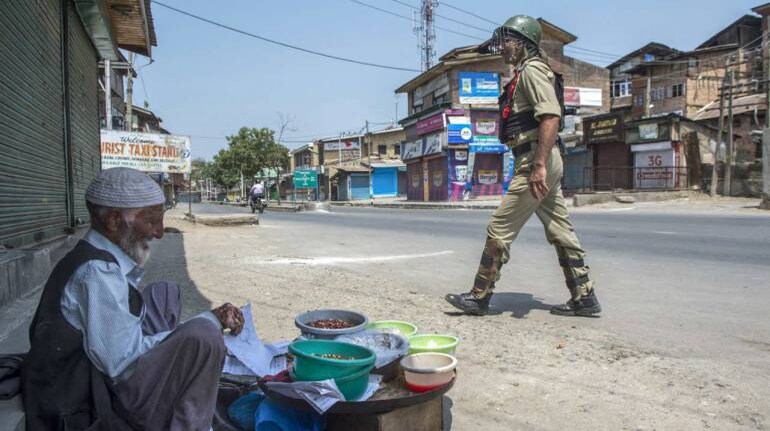



Starting late last Friday, Indian authorities have been cracking down on Kashmiri separatist leaders, Jammu Kashmir Liberation Front Chief Yasin Malik was also detained. Sources privy to the development believe many more such arrests and detentions are in the offing.
The forces, it seems, are focusing largely on separatist outfit Jamaat-e-Islami. The forces carried out raids at the residences of several Jamaat-e-Islami leaders and cadre based in north, south, and central Kashmir.
Among the many members of the organisation arrested, some key ones are Ameer Jama’at Dr Abdul Hamid Fayaz, Advocate Zahid Ali (spokesperson), Ghulam Qadir Lone (former secretary general), Abdur Rouf (Ameer Zila Islamabad), Mudasir Ahmad (Ameer Tehsil Pahalgam), Abdul Salam (Dialgam), Bakhtawar Ahmad (Dialgam), Mohammad Hayat (Tral), Bilal Ahmad (Chadoora), and Ghulam Mohammad Dar (Chak Sangran).
Speaking on the arrests, a JeI spokesperson had dubbed the move a “well-designed conspiracy to pave way for further uncertainty in the region”.
Now, one must note here, the arrests came after Jaish-e-Mohammad planned IED blast in Pulwama that killed over 40 CRPF men. Incidentally, the Supreme Court is also due to hear petitions against Article 35A, which grants special rights to permanent residents of Jammu and Kashmir.
Speaking on similar lines, the Jamaat said “something seems fishy at this moment when states special position is listed in Supreme Court. Article 35(A) which grants special status to the state of Jammu and Kashmir is being heard within days and the way forces personnel unleashed the spree of mass arrest and detained dozens of Jamaat members prior to the hearing seems something is hatching behind the curtains”.
The Police, however, are terming these nocturnal raids as “preparations” for the upcoming general elections. While Jamaat claims to be a separatist group, J&K police claim they have been actively been fuelling terrorism. The outfit’s officials, many of whom have fought Parliamentary and Assembly elections, however, claim they do not indulge in or entertain armed insurgency.
In the absence of concrete proof, it is difficult to establish if Jamaat is really involved in fanning terror activities in the restive state or if the clampdown against them is unjust.
Just like the Hindu fringe group RSS, Jamaat is a cadre-based organisation. It was founded by Abul Ala Maududi, a theologian and philosopher, in 1941’s British-ruled India. It began as an Islamic-political organisation and a movement, accompanied by the likes of the Muslim Brotherhood.
Maududi strongly believed Islam is essential for politics and soon JeI became the first organisation to develop "an ideology based on the modern revolutionary concept of Islam.”
The Islamist theologist believed secularism, nationalism, and socialism to be products of western imperialism and thought it necessary to establish sharia (Islamic Law).
The 1947 partition of India drove a wedge through the organisation, splitting it into Jamaat-e-Islami Pakistan and Jamaat-e-Islami Hind.
The years following partition saw the middle-class intelligentsia and youth being swayed by Jamaat, whose Kashmiri leadership was in favour of a merger with Pakistan.
The year 1952 saw yet another rift develop in the outfit over the varied narratives of the Kashmir dispute, and a Kashmir branch broke off the Jamaat-e-Islami Hind.
A constitution for the Kashmir branch was drafted a year later and an amir (president) was elected. Sa'aduddin Tarbali, the new amir began preaching Jamaat ideology, creating its base first in Shopian.
Its stint in politicsDuring Tarbali’s tenure, several schools were built and charitable trusts formed, alongside a expansion in its ambit of activities, making a silent foray into the political arena.
The group participated in the 1971 general elections, hoping to get a larger platform to propagate their ideology and a means to implement them through legislation. However, it couldn’t win a single seat.
Not backing down, The Jamaat contested Assembly elections in 1972, this time with the hopes “to challenge the notion that politics and religion are separate”. This time five seats were won.
Jamaat’s popularity grew manifold after it played anti-sheikh cards when Sheikh Abdullah signed an accord with Indira Gandhi in 1975, dropping his demand of right to self-determination for Kashmiris.
At this time Jamaat was the only major organisation talking about right to self-determination of Kashmiris. Shortly after, Emergency was declared and Jamaat became a banned outfit for the first time.
Jamaat contested elections in alliance with few other religious orgaisations (Muslim United Front) in 1987 and it was the last one they fought in J&K.
Jamaat’s alleged terror tiesAfter allegations of mass rigging in the 1987 polls had filled the air, MUF activists were arrested for staging protests. Among those arrested was Mohammad Yousuf Shah, who was the group’s then Srinagar head. He later joined Hizbul Mujahideen as its supreme commander and came to be known by his alias Syed Salahuddin.
By 1990s, when many Kashmiri youths were taking arms training in Pakistan, Jamaat had also allegedly begun supporting insurgency.
In the same year, Ahsan Dar, founder and chief commander of Hizbul Mujahideen, dubbed the outfit a "sword arm of Jamaat".
In 1997, Jamaat claimed they have no ties with the Hizbul and that it never backed the insurgency.
Why were they arrested then?Despite all claims, security agencies believe that “the structure of Jamaat is used in Kashmir for pro-Pakistan and militant activities”.
K Rajendra, ex-DGP, Jammu and Kashmir Police, had said: “They are the root cause of the problem in Kashmir.”
According to a News18 report, there is a belief that most terrorists are influenced by Jamaat’s ideology and their leaders are responsible for instigating the masses.
Discover the latest Business News, Sensex, and Nifty updates. Obtain Personal Finance insights, tax queries, and expert opinions on Moneycontrol or download the Moneycontrol App to stay updated!
Find the best of Al News in one place, specially curated for you every weekend.
Stay on top of the latest tech trends and biggest startup news.